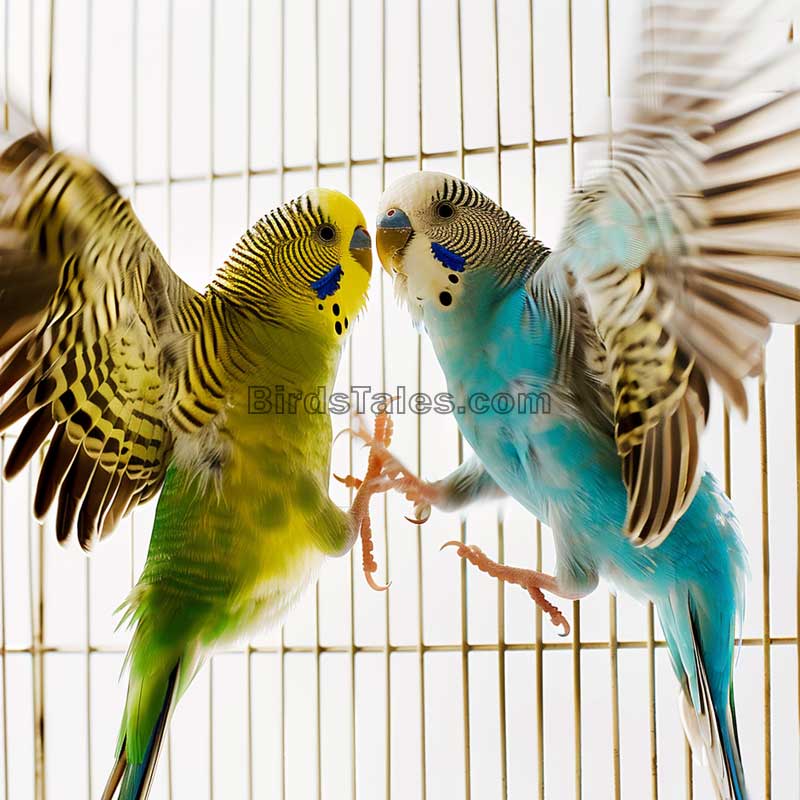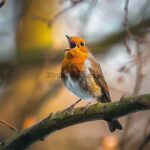Parakeet Social Dynamics
Parakeets, or budgies, are social birds.
They live in flocks in the wild.
This social nature carries over to captivity.
In their natural habitat, they communicate, play, and sometimes bicker, much like humans.
Understanding their social behavior is key.
Flock dynamics mean that each bird has its place.
This hierarchy can cause friction.
Imagine a crowded bus.
Everyone wants a seat.
Parakeets want their perch.
Aggressive behavior can arise from these social interactions.
Dominance plays a role.
One bird may try to assert control.
This can lead to pecking and chasing.
It’s a natural process but can be stressful in confined spaces.
Identifying Signs of Aggression and Stress
Aggression signs in parakeets include:
- Feather plucking: This can be self-inflicted or from another bird.
- Screeching: Loud, persistent noise is a clear indicator.
- Physical attacks: Biting and chasing are common.
Stress signs include:
- Hiding: Birds may retreat to corners or behind toys.
- Loss of appetite: A stressed bird might stop eating.
- Restlessness: Pacing or constant movement can indicate stress.
It’s like living with a roommate who won’t leave you alone.
Keep an eye out.
Address these signs early to prevent escalation.
Common Triggers of Fighting Among Parakeets
Several factors can trigger fighting:
- Territory: Parakeets may fight over perches or food bowls. Think of it as neighbors arguing over parking spots.
- Mating behavior: Males may become aggressive during breeding season. It’s their way of showing off and asserting dominance.
- Overcrowding: A small cage can lead to more fights. Space is limited, and tempers flare.
- New bird: Introducing a new parakeet can disrupt the harmony. It’s like a new kid in school trying to find their place.
- Stress: Loud noises or lack of sleep can increase aggression. A noisy environment can be like living next to a construction site.
Understand these triggers.
Recognize them to better manage your parakeets.
Strategic Solutions to Reduce Conflict
Reducing parakeet fights involves making changes in their environment and routines.
A peaceful home is essential.
Enhancing Cage Environment to Prevent Fights
To reduce competition:
- Provide multiple perches at different heights. This mimics their natural environment.
- Use several feeding stations. Less competition for food reduces stress.
- Ensure the cage is spacious. More room means less conflict.
Avoid overcrowding.
A larger cage gives each bird space.
Use toys and distractions.
Keep them engaged.
It’s like giving kids plenty of activities to prevent boredom.
Rotate toys to keep things interesting.

Importance of Proper Socialization
Proper socialization helps in reducing aggression.
Introduce new parakeets gradually.
Imagine meeting a new friend.
It takes time to build trust.
Use separate cages initially.
Let them see each other but not interact directly.
This reduces immediate tension.
Monitor their interactions closely.
Look for signs of acceptance.
Spend time interacting with them.
Your presence can calm them.
It’s like being a mediator in a conflict.
Regular playtime is crucial.
Engage with them daily.
This reduces boredom and potential aggression.
When to Seek Professional Help
Sometimes, fights are severe and need expert help.
Persistent aggression can be worrying.
If the fights do not subside, seek advice.
Consulting with a Veterinarian
Consult a veterinarian if:
- Aggression is severe. Injuries occur frequently.
- There are injuries. Wounds need proper care.
- Stress signs persist. Long-term stress is harmful.
Prepare information about your parakeets’ behavior and health.
Keep a log of incidents.
This helps the vet understand the situation.
Ask questions about diet, environment, and any changes needed.
A vet can provide solutions.
They may suggest dietary changes or environmental adjustments.
Don’t wait too long.
Early intervention can prevent bigger issues.
Conclusion
Understanding why parakeets fight is the first step.
Apply the advice provided to reduce conflicts.
Keep observing and learning about your pets’ behaviors to maintain a peaceful environment.




